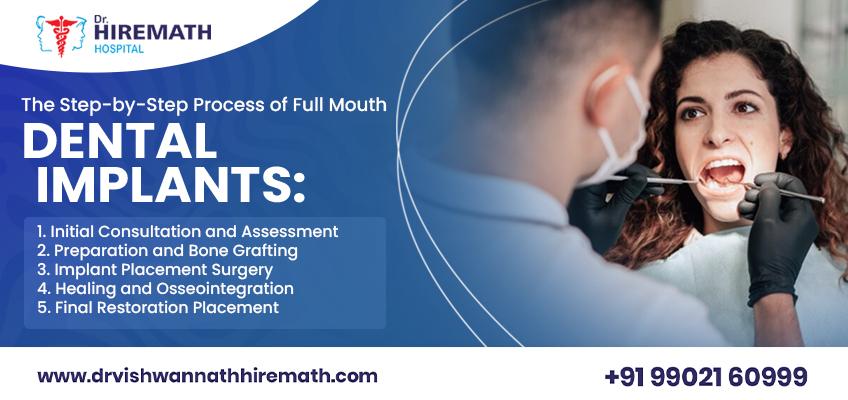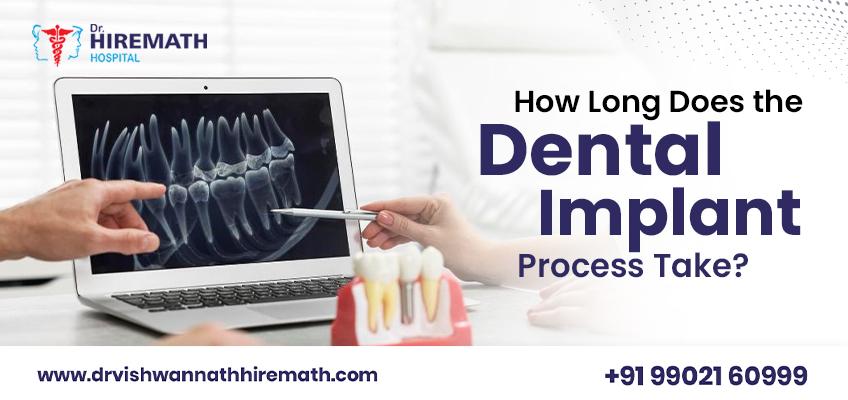How Long Does the Full Mouth Dental Implant Process Take?
Are you considering full-mouth dental implants but wondering, “How long will this process really take?” It is a common question and one that can make the journey seem a bit overwhelming. Don’t worry, you are not alone!
It is important to understand the process and how long each step takes. This will help you plan and set realistic expectations. So, you can better prepare yourself mentally or financially. It also reduces any anxiety about the procedure.
In this blog, we will guide you through the process of full-mouth dental implants and breakdown the journey. Hopefully you will get a clear idea of what to expect and how long each part typically lasts.
The Step-by-Step Process of Full Mouth Dental Implant
It’s a detailed procedure with several key steps. Let’s breakdown the journey into 5 steps.

Initial Consultation and Assessment:
This is where your journey actually begins. During this step, the dentist will examine your oral health and medical history and discuss your goals throughout the consultation. Sometimes X-rays and scans may be taken to assess the bone density and structure to verify if you are a good candidate for dental implants. The initial consultation takes a maximum of 1 to 2 hours.
Preparation and Bone Grafting (if required):
If any issues are detected, such as your jawbone is not thick or healthy enough for implants, then the solution is bone grafting. It provides implants with a stable foundation. In that case, it will add several months (3-6 months) to the proper healing and intigration before proceeding to the next step.
Implant Placement Surgery:
A titanium post will be placed into the jawbone during this step. This usually takes 1-2 hours. How much time it will take depends on the total number of implants being placed. Sedation or local anaesthesia is used to reduce the discomfort at this step.
Healing and Osseointegration:
After implantation, it will take several months (normally 3-6 months) to bond with the jawbone. As the implants fuse with the jawbone for a strong foundation, this process is called osseointegration.
Final Restoration Placement:
Once the healing process is totally successful, the final set of artificial teeth will be placed. This set is securely attached to the implant post. These custom-designed teeth fit your mouth and provide a full functional and natural appearance.
The entire process, from consultation to implantation, can take several months depending on different types of individual circumstances.
Factors That Influence the Duration of the Full Mouth Dental Implant Process

When you are estimating the duration of full-mouth dental implants, it is influenced by several factors. There are four major key factors that can directly impact the procedure.
Health Status of the Patient:
If you have underlying conditions like diabetes and gum disease, it may take a long time to get healthy. That’s why your overall health plays a crucial role in the process of dental implants. Healthy patients recover faster.
Pre-surgery Assessment:
Before surgery, your oral health, bone structure and overall suitability for implants will be assessed to identify if there is any issue. It will be helpful for more successful and predictable results.
Types of Implant:
There are different types of full-mouth dental implants that can affect the process. While traditional implants might take multiple stages over several months, immediate or same-day implants can speed up the process. Your dentist will recommend the best option which one is suitable for you based on your oral condition.
Surgeon’s Expertise:
The expertise and skills of your surgeon can impact the speed and success of the procedure. A highly experienced surgeon always may be able to perform the entire process more efficiently that directly minimizes the duration of the recovery period. That’s why it is important to choose a qualified full-mouth dental implant specialist for the best outcome.
Managing Expectations and Preparing for the Process
It is important to manage expectations while getting full-mouth dental implants. A more seamless experience can be achieved by being ready for the procedure and knowing what to prepare for.
Setting Realistic Expectation:
This process takes time as well as commitment equally. Over the course of several months, you may assume several appointments. Although the healing process varies from person to person, the results are permanent.
Pre-surgery Tips:
You must prepare yourself by maintaining good oral hygiene before your procedure. In the meantime, if any pre-suregery instruction is recommended, you should follow that too. If you have low bone density, at that point, bone grafting is required. You have to give enough time for proper healing prior to the dental implant procedure.
Post-Procedure Care:
After surgery, you might experience some swelling and discomfort. You may need to follow post-procedure care and instructions as much as your dentist recommends to prevent any kind of infection. It ensures proper healing. For a few weeks, you might have to follow up on appointments and also follow a soft-food diet. A quicker recovery is guaranteed with proper aftercare.
If you prepare ahead of time and have reasonable expectations, it will be easier to handle and experience the numerous benefits of full-mouth dental implants.
Prepare to Move Forward
Depending on various factors, the implant procedure takes time, typically ranging from several months. And if you fully understand every stage, from consultation to implantation, you can better control your expectations and make plans for successful outcomes.
If you are thinking about getting implants, consult with an experienced surgeon. Are you prepared to move forward? Contact the best full-mouth dental implant specialist in Bangalore and start your path to a confident and healthy smile.

